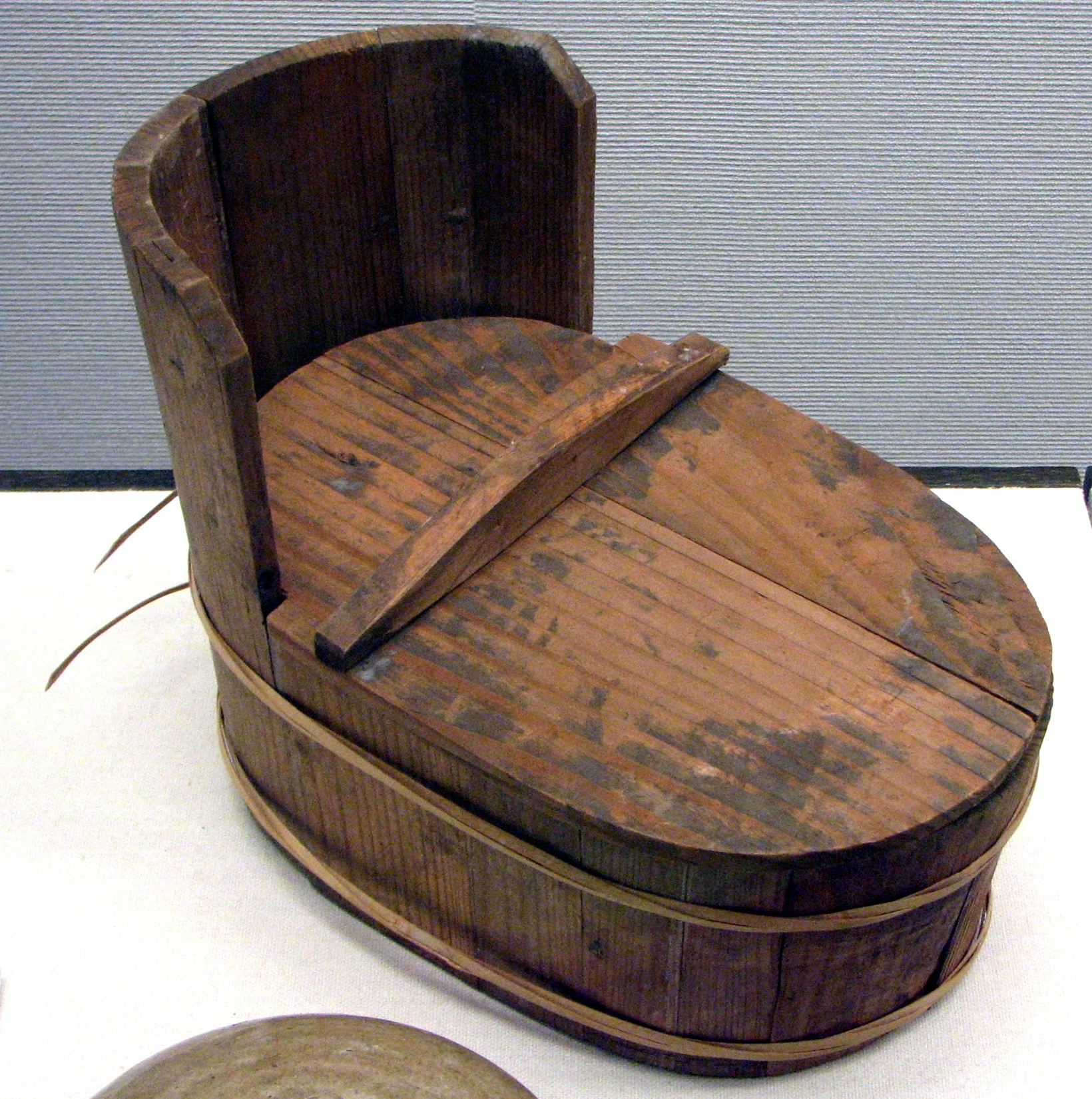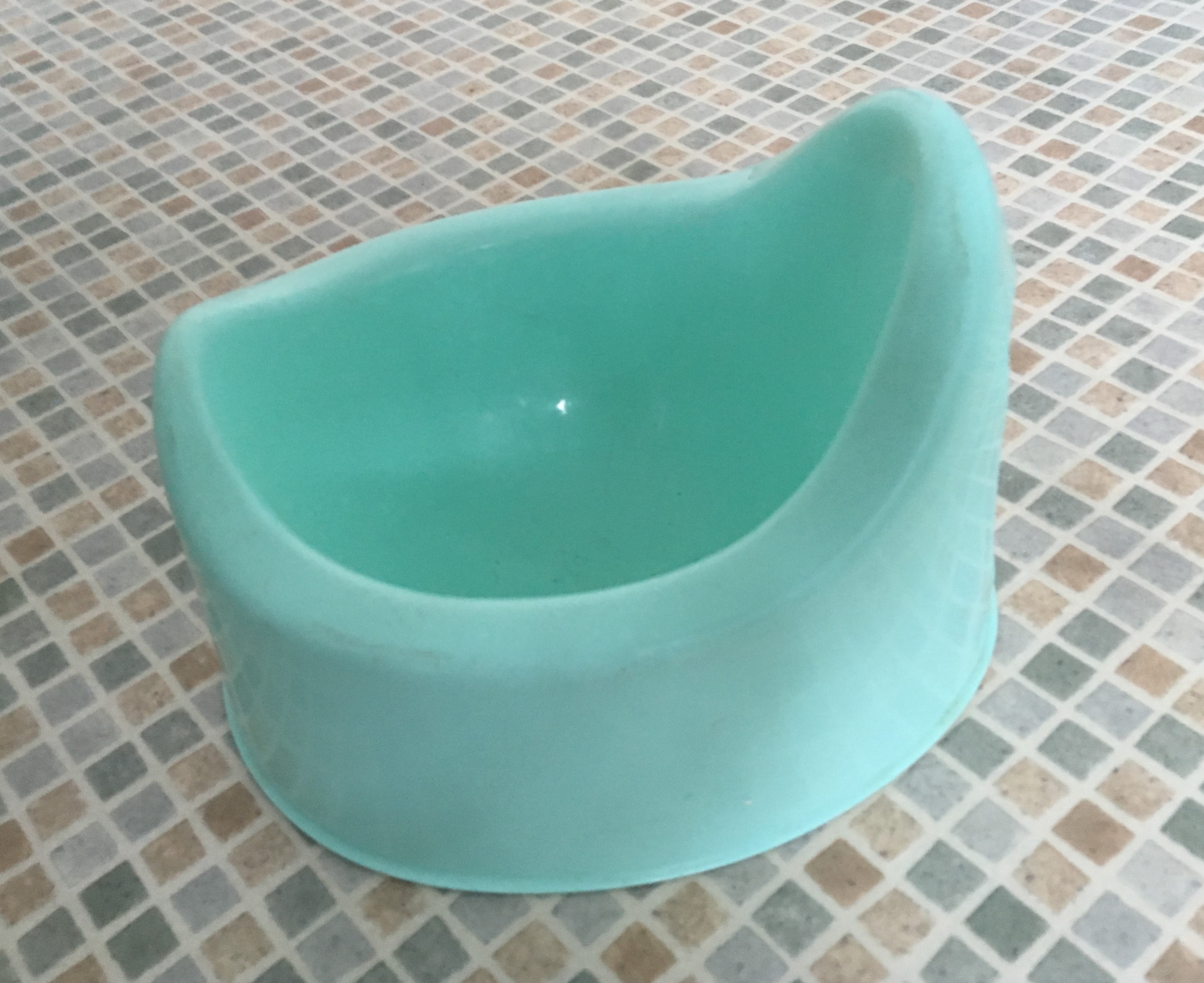Chamberpot on:
[Wikipedia]
[Google]
[Amazon]
 A chamber pot is a
A chamber pot is a
 The term "potty" is usually used to refer to the small, toilet-shaped devices made especially for children training to use the toilet, also called
The term "potty" is usually used to refer to the small, toilet-shaped devices made especially for children training to use the toilet, also called
 A chamber pot is a
A chamber pot is a portable toilet
A portable or mobile toilet (colloquial terms: thunderbox, porta-john, porta-potty or porta-loo) is any type of toilet that can be moved around, some by one person, some by mechanical equipment such as a truck and crane. Most types do not require ...
, meant for nocturnal use in the bedroom. It was common in many cultures before the advent of indoor plumbing
Indoor(s) may refer to:
*the interior of a building
A building or edifice is an enclosed Structure#Load-bearing, structure with a roof, walls and window, windows, usually standing permanently in one place, such as a house or factory. Building ...
and flushing toilets.
Names and etymology
"Chamber" is an older term for bedroom. The chamber pot is also known as a , a jerry, a guzunder, a po (possibly from ), a potty pot, a potty, a thunder pot or a thunder mug. It was also known as a chamber utensil or bedroom ware.History
Chamber pots were used inancient Greece
Ancient Greece () was a northeastern Mediterranean civilization, existing from the Greek Dark Ages of the 12th–9th centuries BC to the end of classical antiquity (), that comprised a loose collection of culturally and linguistically r ...
at least since the 6th century BC and were known under different names: (''amis''), (''ouranē'') and (''ourētris'', from - ''ouron'', "urine"), / (''skōramis''), (''chernibion'').
The introduction of indoor flush toilets started to displace chamber pots in the 19th century, but they remained common until the mid-20th century. The alternative to using the chamber pot was a trip to the outhouse
An outhouse — known variously across the English-speaking world otherwise as bog, dunny, long-drop, or privy — is a small structure, separate from a main building, which covers a toilet. This is typically either a pit latrine or a bucket ...
.
In China, the chamber pot (便壶 (biàn hú) was common. A wealthy salt merchant in the city of Yangzhou became the symbol of conspicuous excess when he commissioned a chamber pot made of gold which was so tall that he had to climb a ladder to use it.
Modern use
Chamber pots continue in use in areas lacking indoor plumbing. In the Philippines, chamber pots are used asurinal
A urinal (, ) is a sanitary plumbing fixture similar to a toilet, but for urination only. Urinals are often provided in men's public restrooms in Western countries (less so in Muslim countries). They are usually used in a standing position. ...
s and are known as ''arinola'' in most Philippine languages
The Philippine languages or Philippinic are a proposed group by R. David Paul Zorc (1986) and Robert Blust (1991; 2005; 2019) that include all the languages of the Philippines and northern Sulawesi, Indonesia—except Sama–Bajaw (language ...
, such as Cebuano and Tagalog
Tagalog may refer to:
Language
* Tagalog language, a language spoken in the Philippines
** Old Tagalog, an archaic form of the language
** Batangas Tagalog, a dialect of the language
* Tagalog script, the writing system historically used for Tagal ...
.
In Korea, chamber pots are referred to as ''yogang'' (요강). They were used by people who did not have indoor plumbing to avoid the cold elements during the winter months.
Children's potties
 The term "potty" is usually used to refer to the small, toilet-shaped devices made especially for children training to use the toilet, also called
The term "potty" is usually used to refer to the small, toilet-shaped devices made especially for children training to use the toilet, also called potty training
Toilet training (also potty training or toilet learning) is the process of training someone, particularly a toddler or infant, to use the toilet for urination and defecation. Attitudes toward training in recent history have fluctuated substantial ...
, which are similar to chamber pots. These "potties" are generally a large plastic bowl with an ergonomically designed back and front to protect against splashes. They may have a built-in handle or grasp at the back to allow easy emptying and a non-slip bottom to prevent the child from sliding while in use. Some are given bright colors, and others may feature gentle or unoffensive drawings or cartoon characters. In many cases they are used since it is difficult for children to maneuver themselves up onto the normal toilet; in addition the larger opening in the regular toilet is much too wide for a child to sit over comfortably and can be intimidating when they first start learning. The size of a potty chair means they can be packed away in a bag for days out or when camping with young children.
Shapes and related items
Three ''bourdaloues'' A chamber pot might be disguised in a sort of chair (aclose stool
A close stool was an early type of portable toilet, made in the shape of a cabinet or box at sitting height with an opening in the top. The external structure contained a pewter or earthenware chamberpot to receive the user's excrement and urine ...
). It might be stored in a cabinet
Cabinet or The Cabinet may refer to:
Furniture
* Cabinetry, a box-shaped piece of furniture with doors and/or drawers
* Display cabinet, a piece of furniture with one or more transparent glass sheets or transparent polycarbonate sheets
* Filin ...
with doors to hide it; this sort of nightstand
A nightstand, alternatively night table, bedside table, daystand or bedside cabinet, is a small table or cabinet designed to stand beside a bed or elsewhere in a bedroom. Modern nightstands are usually small bedside tables, often with one o ...
was known as a commode
A commode is any of many pieces of furniture. The ''Oxford English Dictionary'' has multiple meanings of "commode". The first relevant definition reads: "A piece of furniture with drawers and shelves; in the bedroom, a sort of elaborate chest ...
, hence the latter word came to mean "toilet" as well. For homes without these items of furniture, the chamber pot was stored under the bed.
The modern commode toilet and bedpan
A bedpan or bed pan is a device used as a receptacle for the urine and/or Human feces, feces of a person who is confined to a bed and therefore not able to use a toilet or chamber pot.
Bedpans can be either reusable or disposable, and include s ...
, used by bedbound or disabled persons, are variants of the chamber pot.
A related item was the ''bourdalou'' or ''bourdaloue'', a small handheld oblong ceramic pot used in 17th- and 18th-century France to allow women to urinate conveniently. This item, similar in shape to a deep gravy boat
A sauce boat, gravy boat, or saucière is a low jug or pitcher with a handle in which sauce or gravy is served. The typical shape is considered boat-like, hence the name. It often sits on a matching saucer, sometimes attached to the pitcher, ...
, could be held between the legs and urinated into while standing or crouching, with little risk of soiling their clothing. At the time, women did not customarily wear two-legged underwear as today.
Cultural references
"The Crabfish
"The Crabfish" ( Roud 149, also known as "The Crayfish", "The Codfish", "The Old She-Crab", "The Lobster", "Tommy Doddler", or "A Combat Between an Ale-Wife and a Sea Crab") is a ribald humorous folk song of English origin. It is one of the mo ...
" is a 17th-century folk song about what is most likely a common lobster
''Homarus gammarus'', known as the European lobster or common lobster, is a species of clawed lobster from the eastern Atlantic Ocean, Mediterranean Sea and parts of the Black Sea. It is closely related to the American lobster, ''H. americ ...
, stored in a chamber pot by an unwise fisherman. The moral of the song is that one should look into a chamberpot before using it.
Philippine mythology
Philippine mythology is rooted in the many indigenous Philippine folk religions. Philippine mythology exhibits influence from Hinduism, Hindu, Islam, Muslim, Buddhism, Buddhist, and Christianity, Christian traditions.
Philippine mythology ...
recounts that giving newlyweds a chamber pot assures them of prosperity. President
President most commonly refers to:
*President (corporate title)
* President (education), a leader of a college or university
*President (government title)
President may also refer to:
Arts and entertainment Film and television
*'' Præsident ...
Elpidio Quirino
Elpidio Rivera Quirino (; November 16, 1890 – February 29, 1956) was a Philippine nationality law, Filipino lawyer and politician who served as the 6th President of the Philippines from 1948 to 1953.
A lawyer by profession, Quirino entered p ...
, as part of a smear campaign against him, was falsely rumoured to possess a golden ''arinola''.
In his satire ''Utopia
A utopia ( ) typically describes an imagined community or society that possesses highly desirable or near-perfect qualities for its members. It was coined by Sir Thomas More for his 1516 book ''Utopia (book), Utopia'', which describes a fictiona ...
'', Thomas More
Sir Thomas More (7 February 1478 – 6 July 1535), venerated in the Catholic Church as Saint Thomas More, was an English lawyer, judge, social philosopher, author, statesman, theologian, and noted Renaissance humanist. He also served Henry VII ...
had chamberpots made out of gold.
See also
*History of water supply and sanitation
The history of water supply and sanitation is one of a logistics, logistical challenge to provide Water supply, clean water and sanitation systems since the dawn of civilization. Where water resources, infrastructure or sanitation systems were ins ...
References
{{DEFAULTSORT:Chamber Pot Toilets